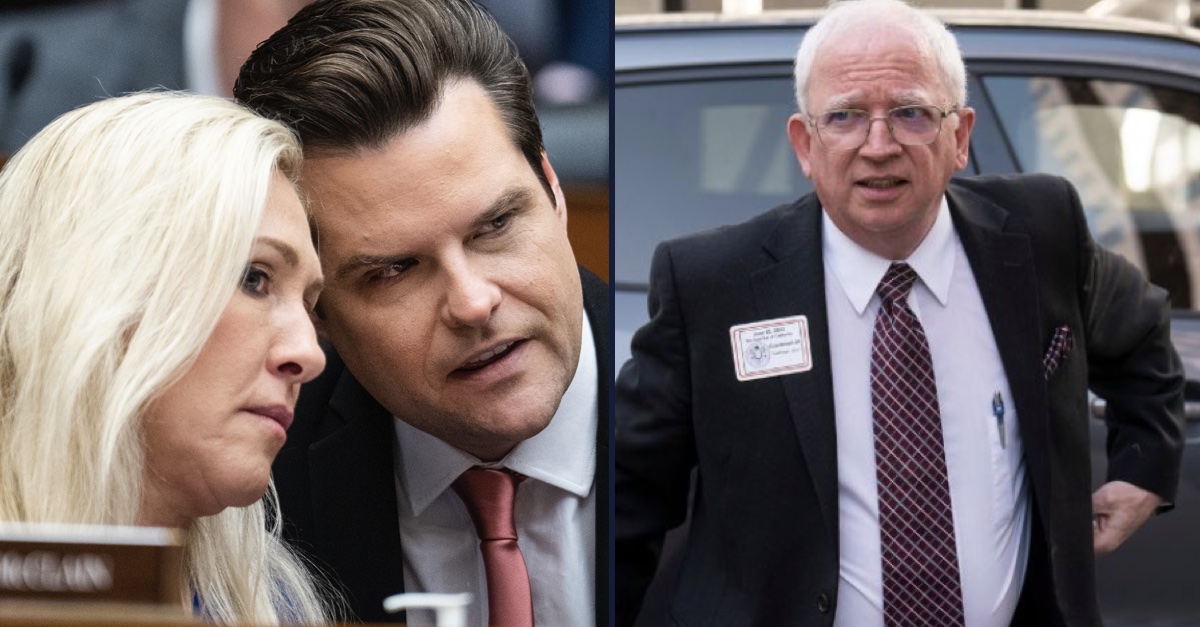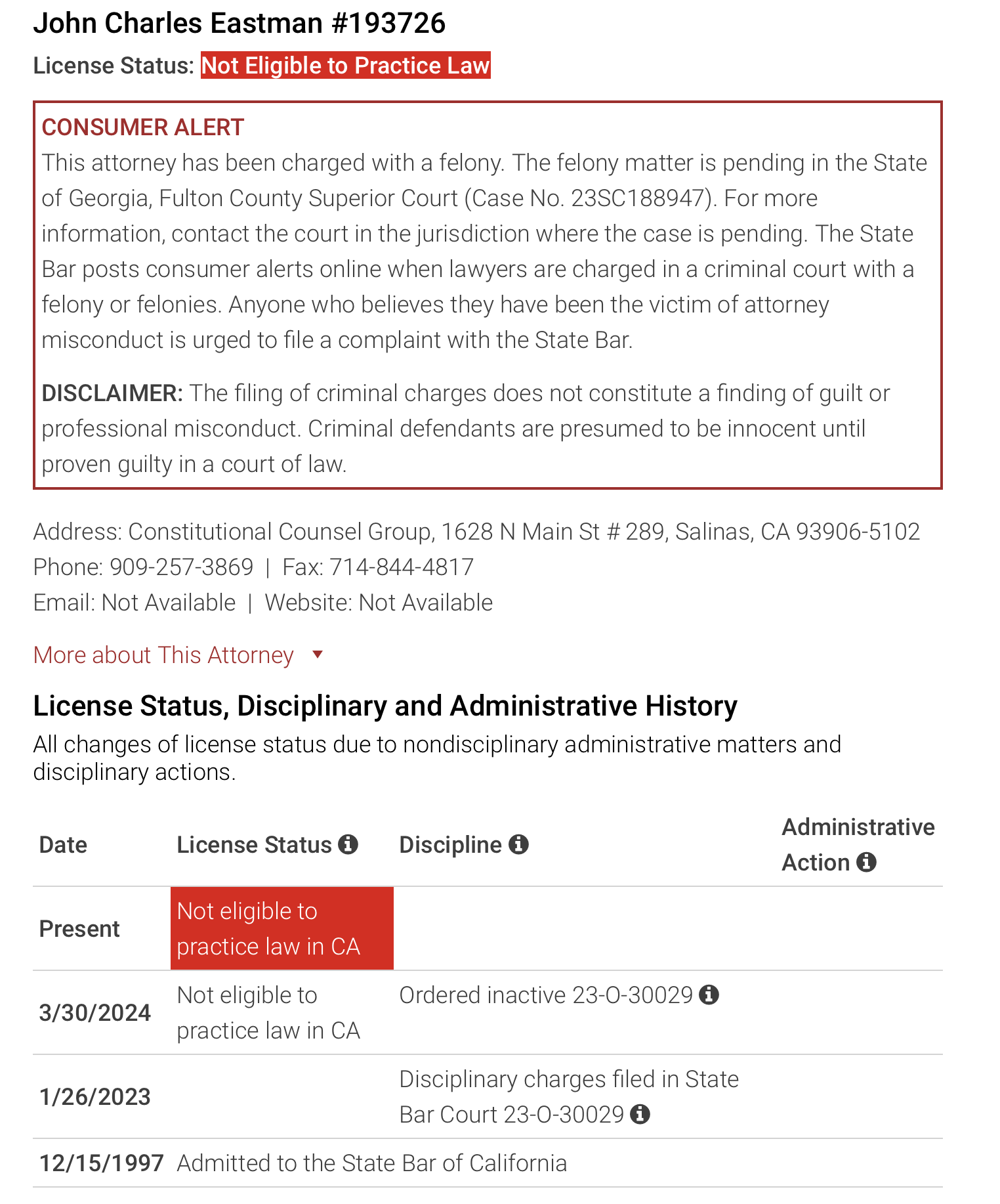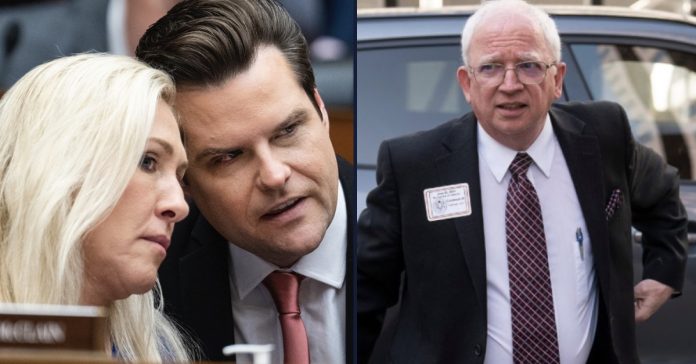
Republican Reps. Marjorie Taylor Greene and Matt Gaetz (left), (right) attorney John Eastman, the architect of a legal strategy aimed at keeping former President Donald Trump in power (AP Photo/Jae C. Hong).
The State Bar of California’s Office of Chief Trial Counsel said Wednesday that Jan. 6 “coup memo” lawyer John Eastman cannot pause his “inactive enrollment” following a judge’s disbarment recommendation. The opposition to the requested stay noticeably cited a “stunningly deficient” recent pleading to support the position that Eastman’s lawyering still “poses a threat of harm” to the public.
In late March, State Bar Court Judge Yvette D. Roland found Eastman violated 10 of 11 attorney misconduct counts he faces, only dismissing one moral turpitude count relating the Eastman’s Jan. 6 speech at the Ellipse in the course of representing former President Donald Trump.
The judge pointed out that Eastman’s Jan. 6 theory that then Vice President Mike Pence had the power under the 12th Amendment as President of the Senate to unilaterally overturn the election was not a belief Eastman had long held. Roland said the 2020 election position Eastman espoused ran counter to what he said in 2000 about Bush v. Gore on the 12th Amendment and Electoral Count Act.
“For example, in November 2000, when Eastman testified before the Florida state legislature in connection with the Bush v. Gore presidential election, Eastman explained that Congress counts the votes, Congress is the ultimate arbiter as to any disputes regarding the count and, Congress answers to no one on this issue,” the judge said.
Even in mid-October 2020, just weeks before the election, Eastman rejected the legal take of Trump supporter that Pence could decide “authoritatively what ‘certificates’ from the states to ‘open’ and what electoral votes are ‘counted,’ under the 12th Amendment and the Electoral Count Act of 1887, 3 U.S.C. §15.”
“I don’t agree with this,” Eastman said. “The 12th Amendment only says that the President of the Senate opens the ballots in the joint session and then, in the passive voice, that the votes shall then be counted. 3 U.S.C. §12 says merely that he is the presiding officer, and then it spells out specific procedures, presumptions, and default rules for which slates will be counted. Nowhere does it suggest that the President of the Senate gets to make the determination on his own. §15 doesn’t either.”
Though Eastman claimed his reversal on the issue was due to “a significant amount of additional research,” Roland concluded he committed attorney misconduct because he “knowingly made […] false statements or had no reasonable factual or legal basis for making them” in “court filings and other written statements, as well as in conversations with others and in public remarks” on Trump’s behalf.
This is what Eastman’s State Bar of California profile looks like these days as a result:

While Eastman has tried to pause his “inactive enrollment” with the bar until his appeal of the disbarment recommendation concludes, the bar responded Wednesday that Trump’s 2020 election lawyer is simply not entitled to that relief.
“[R]espondent is not seeking merely to delay or temporarily stay his inactive enrollment for some specified period of days or weeks to permit the winding up and transition of client matters,” the bar said. “Rather, as respondent’s motion makes clear, he is seeking termination of the order for inactive enrollment to enable him to remain on active status throughout his appeal of the recommendation for disbarment. Neither rule 9.10, rule 5.162, nor any other rule authorizes such action.”
Recall that the former Chapman University law professor under indictment along with Trump argued he needs to continue working as a lawyer in order to pay off legal bills stemming from the Georgia RICO case, noting that he is presumed innocent until proven guilty.
The bar said that Eastman’s “stunningly deficient” lawyering on behalf of Rep. Matt Gaetz, R-Fla., and Rep. Marjorie Taylor Greene, R-Ga., in a California federal lawsuit only supports that state’s contention that there is a risk of harm in allowing Eastman to practice law while he appeals the disbarment recommendation.
As Law&Crime reported a couple of weeks ago, U.S. District Judge Hernan Vera took shots at Eastman even as the jurist allowed the lawsuit to proceed in part against the cities of Anaheim and Riverside for canceling his clients’ 2021 political rallies.
The judge slammed Eastman, Gaetz, and Greene for suing the League of Women Voters, the National Association for the Advancement of Colored People (NAACP), and the League of United Latin American Citizens (LULAC) based on a “conspiracy theory.”
“The gravamen of plaintiffs’ claims against the nonprofit defendants is, both legally and literally, a conspiracy theory that relies purely on conjecture,” Vera wrote. “And without an unlawful conspiracy, all that is left to aver against the Nonprofit Defendants are the unremarkable allegations that they exercised their own First Amendment rights to lobby for the cancellation of the event. That is protected.”
“The effect of Plaintiffs’ unprecedented and stunningly deficient pleading — haling nine civil rights groups into federal court for speaking out against an event — should shock in equal measure civic members from across the political spectrum,” he added — and the Office of Chief Trial Counsel noticed.
“[T]hat respondent’s current clients want his continued representation does nothing to establish that there is no risk of harm from respondent’s continued handling of cases on behalf of those clients,” the office said, pointing to Vera’s ruling. “Indeed, a recent ruling in a case in which respondent represents some of those clients who desire his continued representation demonstrates the risks.”
Read the latest filing here.
Have a tip we should know? [email protected]

